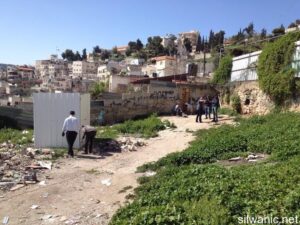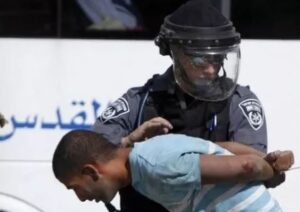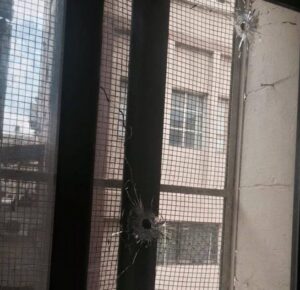Jeff Warner & Dick Platkin, Mondoweiss – In the past month much has been written about two incidents of anti-Semitism at the University of California campuses. According to the NY Times and the Los Angeles Times, they represent a national trend of revived campus anti-Semitism.
We think an even cursory look at these two incidents reveals a different story, with some surprising revelations about them and the new role of Israel itself as the cause of a new anti-Semitism.
One incident was a swastika painted on the wall of a Jewish fraternity house at UC Davis after a campus divestment campaign. The frat boys claim this incident was the work of pro-Palestinian BDS activists. But neither they nor the campus cops have come forth with a shred of evidence. Their charge, nevertheless, follows a broader trend labeled the New Anti-Semitism. Defenders of the Israeli government equate criticisms of Israel, especially university divestment proposals, with earlier forms of anti-Semitism based on Christian theology or Nazi-type racial theories.
The second incident was at UCLA, where there has been no similar incident, before or after. A Jewish undergraduate who is a campus Hillel officer, Rachel Beyda, applied to join the undergraduate Judicial Board. In her interview student government officers asked if her involvement with campus Jewish organizations, specifically UCLA Hillel and her sorority, allowed her to impartially serve on the Judicial Board. Several days later, her roommate wrote an article for The Daily Bruin, stating that she overheard the student officers, meeting in executive session after the interview, raise questions of dual loyalty.
In this case, we have a full video of the interview and also an extensive written record of Israel-related activism on the UCLA campus. This context includes the intervention of an off-campus businessman and convicted felon, Adam Milstein. Milstein is connected to right-wing Zionist groups and has funneled money through UCLA Hillel to influence student elections and oppose divestment campaigns on the UCLA campus led by Students for Justice in Palestine UCLA.
Although the details of the UC Davis case remain unknown, in the case of UCLA, there is a back-story to the anti-Semitic questioning of Rachel Beyda’s, namely Hillel’s role in funneling Milstein’s money into student elections. Although this history has been excluded from the multiple stories about the incident, we believe that Milstein’s intervention through Hillel led to the student interviewers’ doubts about Hillel officer Rachel Beyda’s judicial impartiality.
While the student officers approved her application after their executive session, it took the intervention of staff advisor, Debra Geller. She explained to the student officers that an applicant’s ethnic or religious identity could not be used to evaluate his or her candidacy.
How do these two incidents compare to empirical trends regarding anti-Semitic practices on U.S. college campuses? According to the Anti-Defamation League, which conducts an annual audit of anti-Semitic incidents in the United States, anti-Semitism at US college campuses is at a historic low point. As we have written previously in Mondoweiss, actual anti-Semitic incidents are barely measureable, and the long history of discrimination against Jews in academia has disappeared.
There are no more glass ceilings for Jewish professors to become department chairs, deans, or college presidents. Admission quotas, especially for medical schools, are long gone. And, fraternities and sororities have all dropped discriminatory clauses barring Jews from membership. Finally, students interested in Jewish or Israeli studies, as well as Hebrew and Yiddish, now have multiple options at many campuses.
These developments are fully observable at UCLA, where the University’s Chancellor, Gene D. Bloch, is Jewish. UCLA also offers abundant opportunities to take Jewish-related courses, write for Jewish publications, or participate in Jewish organizations. In fact, UCLA Hillel Executive Director Rabbi Chaim Seidler-Feller described these trends in full detail for one of his recent High Holiday sermons.
This brings us to the ultimate irony of these real and imagined anti-Semitic incidents on American campuses. They are largely push back against externally orchestrated Israel advocacy, usually through Jewish institutions that receive support from the Israeli government, Israel-connected organization like the Jewish National Fund and AIPAC, or outside donors, like Milstein. In many cases they operate well-funded programs, such as Hasbara Fellows, to train campus operatives supportive of the Israeli government.
So even though overall trends continue downward, the appearance of several anti-Semitic incidents directly or potentially related to Israel is simply blowback against clumsy efforts to oppose BDS campaigns or Israel Apartheid Week, a common spring program of Students for Justice in Palestine chapters.
In other words, even though Israel was established by the Zionist movement to escape what it viewed as ineradicable anti-Semitism, Israel’s oppression of the Palestinian people and its efforts to quash dissent in the U.S. have resulted in pushback that Israeli advocates mislabel as “anti-Semitism” or the New Anti-Semitism. But political disagreement with Israel’s policies is not based on hatred of Jews. Rather, it is opposition to Israel’s policies of occupation and denying Palestinians individual and group rights. When it is incorrectly labeled “anti-Semitism,” it is a blatant attempt to suppress political speech.
Ironically, Israel and its extremist supporters in the United States are undercutting the work of Jewish defense organizations, such as the Anti-Defamation League, that have had extraordinary success over the past century in eliminating real anti-Semitism.
One of their achievements was to rebut widespread allegations that American Jews had divided loyalties between the United States and Israel.
Recent Israeli declarations, however, from Netanyahu himself, that Israel is the state of the entire Jewish people, have revived these suspicions, including at UCLA. When pro-Israel activists claim they speak for all Jews, it stigmatizes Jews everywhere with the biases of these pro-Israel activists. That perception is what underlay the reported statements from student officers about Rachel Beyda’s divided loyalties.
As we examine these and related cases, we come to an inescapable conclusion. Defenders of the Israeli government are fostering incidents of anti-Semitism that Israel was intended to ward off.
#
In addition to the above, it’s important to remember that a few years ago an AIPAC leader announced how AIPAC was going to counter the BDS movement on campuses.
As I wrote in an earlier blog entry:
“In a chilling JTA video from this convention, longtime AIPAC operative Jonathon Kessler is seen describing the Israel lobby’s’ plan to take over the University of California Berkeley student government, which had passed by 16-4 a resolution detested by the pro-Israel lobby.
In front of a cheering throng, Kessler announced:
“‘We’re going to make certain that pro-Israel students take over the student government and reverse the vote. That is how AIPAC operates in our nation’s capitol. This is how AIPAC must operate on our nation’s campuses.'”
#
For more embedded links in the Warner-Platkin article go to Mondoweiss.
In the past month much has been written about two incidents of anti-Semitism at University of California campuses. According to the NY Times and the Los Angeles Times, they represent a national trend of revived campus anti-Semitism.
We think an even cursory look at these two incidents reveals a different story, with some surprising revelations about them and the new role of Israel itself as the cause of a new anti-Semitism.
One incident was a swastika painted on the wall of a Jewish fraternity house at UC Davis after a campus divestment campaign. The frat boys claim this incident was the work of pro-Palestinian BDS activists. But neither they nor the campus cops have come forth with a shred of evidence. Their charge, nevertheless, follows a broader trend labeled the New Anti-Semitism. Defenders of the Israeli government equate criticisms of Israel, especially university divestment proposals, with earlier forms of anti-Semitism based on Christian theology or Nazi-type racial theories.
The second incident was at UCLA, where there has been no similar incident, before or after. A Jewish undergraduate who is a campus Hillel officer, Rachel Beyda, applied to join the undergraduate Judicial Board. In her interview student government officers asked if her involvement with campus Jewish organizations, specifically UCLA Hillel and her sorority, allowed her to impartially serve on the Judicial Board. Several days later, her roommate wrote an article for The Daily Bruin, stating that she overheard the student officers, meeting in executive session after the interview, raise questions of dual loyalty.
In this case we have a full video of the interview and also an extensive written record of Israel-related activism on the UCLA campus. This context includes the intervention of an off-campus businessman and convicted felon, Adam Milstein. Milstein is connected to right-wing Zionist groups and has funneled money through UCLA Hillel to influence student elections and oppose divestment campaigns on the UCLA campus lead by Students for Justice in Palestine UCLA.
Although the details of the UC Davis case remain unknown, in the case of UCLA, there is a back-story to the anti-Semitic questioning of Rachel Beyda’s, namely Hillel’s role in funneling Milstein’s money into student elections. Although this history has been excluded from the multiple stories about the incident, we believe that Milstein’s intervention through Hillel led to the student interviewers’ doubts about Hillel officer Rachel Beyda’s judicial impartiality.
While the student officers approved her application after their executive session, it took the intervention of staff advisor, Debra Geller. She explained to the student officers that an applicant’s ethnic or religious identity could not be used to evaluate his or her candidacy.
How do these two incidents compare to empirical trends regarding anti-Semitic practices on U.S. college campuses? According to the Anti-Defamation League, which conducts an annual audit of anti-Semitic incidents in the United States, anti-Semitism at US college campuses is at a historic low point. As we have written previously in Mondoweiss, actual anti-Semitic incidents are barely measureable, and the long history of discrimination against Jews in academia has disappeared. There are no more glass ceilings for Jewish professors to become department chairs, deans, or college presidents. Admission quotas, especially for medical schools, are long gone. And, fraternities and sororities have all dropped discriminatory clauses barring Jews from membership. Finally, students interested in Jewish or Israeli studies, as well as Hebrew and Yiddish, now have multiple options at many campuses.
These developments are fully observable at UCLA, where the University’s Chancellor, Gene D. Bloch, is Jewish. UCLA also offers abundant opportunities to take Jewish-related courses, write for Jewish publications, or participate in Jewish organizations. In fact, UCLA Hillel Executive Director Rabbi Chaim Seidler-Feller described these trends in full detail for one of his recent High Holiday sermons.
This brings us to the ultimate irony of these real and imagined anti-Semitic incidents on American campuses. They are largely push back against externally orchestrated Israel advocacy, usually through Jewish institutions that receive support from the Israeli government, Israel-connected organization like the Jewish National Fund and AIPAC, or outside donors, like Milstein. In many cases they operate well-funded programs, such as Hasbara Fellows, to train campus operatives supportive of the Israeli government.
So even though overall trends continue downward, the appearance of several anti-Semitic incidents directly or potentially related to Israel is simply blowback against clumsy efforts to oppose BDS campaigns or Israel Apartheid Week, a common spring program of Students for Justice in Palestine chapters.
In other words, even though Israel was established by the Zionist movement to escape what it viewed as ineradicable anti-Semitism, Israel’s oppression of the Palestinian people and its efforts to quash dissent in the U.S. have resulted in pushback that Israeli advocates mislabel as “anti-Semitism” or the New Anti-Semitism. But political disagreement with Israel’s policies is not based on hatred of Jews. Rather, it is opposition to Israel’s policies of occupation and denying Palestinians individual and group rights. When it is incorrectly labeled “anti-Semitism,” it is a blatant attempt to suppress political speech.
Ironically, Israel and its extremist supporters in the United States are undercutting the work of Jewish defense organizations, such as the Anti-Defamation League, that have had extraordinary success over the past century in eliminating real anti-Semitism. One of their achievements was to rebut widespread allegations that American Jews had divided loyalties between the United States and Israel. Recent Israeli declarations, however, from Netanyahu himself, that Israel is the state of the entire Jewish people, have revived these suspicions, including at UCLA. When pro-Israel activists claim they speak for all Jews, it stigmatizes Jews everywhere with the biases of these pro-Israel activists. That perception is what underlay the reported statements from student officers about Rachel Beyda’s divided loyalties.
As we examine these and related cases, we come to an inescapable conclusion. Defenders of the Israeli government are fostering incidents of anti-Semitism that Israel was intended to ward off.
– See more at: http://mondoweiss.net/2015/03/blowback-orchestrated-advocacy#sthash.WBIUGVZm.dpuf
In the past month much has been written about two incidents of anti-Semitism at University of California campuses. According to the NY Times and the Los Angeles Times, they represent a national trend of revived campus anti-Semitism.
We think an even cursory look at these two incidents reveals a different story, with some surprising revelations about them and the new role of Israel itself as the cause of a new anti-Semitism.
One incident was a swastika painted on the wall of a Jewish fraternity house at UC Davis after a campus divestment campaign. The frat boys claim this incident was the work of pro-Palestinian BDS activists. But neither they nor the campus cops have come forth with a shred of evidence. Their charge, nevertheless, follows a broader trend labeled the New Anti-Semitism. Defenders of the Israeli government equate criticisms of Israel, especially university divestment proposals, with earlier forms of anti-Semitism based on Christian theology or Nazi-type racial theories.
The second incident was at UCLA, where there has been no similar incident, before or after. A Jewish undergraduate who is a campus Hillel officer, Rachel Beyda, applied to join the undergraduate Judicial Board. In her interview student government officers asked if her involvement with campus Jewish organizations, specifically UCLA Hillel and her sorority, allowed her to impartially serve on the Judicial Board. Several days later, her roommate wrote an article for The Daily Bruin, stating that she overheard the student officers, meeting in executive session after the interview, raise questions of dual loyalty.
In this case we have a full video of the interview and also an extensive written record of Israel-related activism on the UCLA campus. This context includes the intervention of an off-campus businessman and convicted felon, Adam Milstein. Milstein is connected to right-wing Zionist groups and has funneled money through UCLA Hillel to influence student elections and oppose divestment campaigns on the UCLA campus lead by Students for Justice in Palestine UCLA.
Although the details of the UC Davis case remain unknown, in the case of UCLA, there is a back-story to the anti-Semitic questioning of Rachel Beyda’s, namely Hillel’s role in funneling Milstein’s money into student elections. Although this history has been excluded from the multiple stories about the incident, we believe that Milstein’s intervention through Hillel led to the student interviewers’ doubts about Hillel officer Rachel Beyda’s judicial impartiality.
While the student officers approved her application after their executive session, it took the intervention of staff advisor, Debra Geller. She explained to the student officers that an applicant’s ethnic or religious identity could not be used to evaluate his or her candidacy.
How do these two incidents compare to empirical trends regarding anti-Semitic practices on U.S. college campuses? According to the Anti-Defamation League, which conducts an annual audit of anti-Semitic incidents in the United States, anti-Semitism at US college campuses is at a historic low point. As we have written previously in Mondoweiss, actual anti-Semitic incidents are barely measureable, and the long history of discrimination against Jews in academia has disappeared. There are no more glass ceilings for Jewish professors to become department chairs, deans, or college presidents. Admission quotas, especially for medical schools, are long gone. And, fraternities and sororities have all dropped discriminatory clauses barring Jews from membership. Finally, students interested in Jewish or Israeli studies, as well as Hebrew and Yiddish, now have multiple options at many campuses.
These developments are fully observable at UCLA, where the University’s Chancellor, Gene D. Bloch, is Jewish. UCLA also offers abundant opportunities to take Jewish-related courses, write for Jewish publications, or participate in Jewish organizations. In fact, UCLA Hillel Executive Director Rabbi Chaim Seidler-Feller described these trends in full detail for one of his recent High Holiday sermons.
This brings us to the ultimate irony of these real and imagined anti-Semitic incidents on American campuses. They are largely push back against externally orchestrated Israel advocacy, usually through Jewish institutions that receive support from the Israeli government, Israel-connected organization like the Jewish National Fund and AIPAC, or outside donors, like Milstein. In many cases they operate well-funded programs, such as Hasbara Fellows, to train campus operatives supportive of the Israeli government.
So even though overall trends continue downward, the appearance of several anti-Semitic incidents directly or potentially related to Israel is simply blowback against clumsy efforts to oppose BDS campaigns or Israel Apartheid Week, a common spring program of Students for Justice in Palestine chapters.
In other words, even though Israel was established by the Zionist movement to escape what it viewed as ineradicable anti-Semitism, Israel’s oppression of the Palestinian people and its efforts to quash dissent in the U.S. have resulted in pushback that Israeli advocates mislabel as “anti-Semitism” or the New Anti-Semitism. But political disagreement with Israel’s policies is not based on hatred of Jews. Rather, it is opposition to Israel’s policies of occupation and denying Palestinians individual and group rights. When it is incorrectly labeled “anti-Semitism,” it is a blatant attempt to suppress political speech.
Ironically, Israel and its extremist supporters in the United States are undercutting the work of Jewish defense organizations, such as the Anti-Defamation League, that have had extraordinary success over the past century in eliminating real anti-Semitism. One of their achievements was to rebut widespread allegations that American Jews had divided loyalties between the United States and Israel. Recent Israeli declarations, however, from Netanyahu himself, that Israel is the state of the entire Jewish people, have revived these suspicions, including at UCLA. When pro-Israel activists claim they speak for all Jews, it stigmatizes Jews everywhere with the biases of these pro-Israel activists. That perception is what underlay the reported statements from student officers about Rachel Beyda’s divided loyalties.
As we examine these and related cases, we come to an inescapable conclusion. Defenders of the Israeli government are fostering incidents of anti-Semitism that Israel was intended to ward off.
– See more at: http://mondoweiss.net/2015/03/blowback-orchestrated-advocacy#sthash.WBIUGVZm.dpuf










